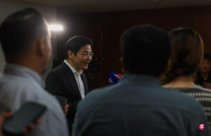Source: Bloomberg
Author: Ye XIE
With the growth of the US economy in month of month, hundreds of thousands of jobs were created, and those experts who warned the economic recession were puzzled, and some Wall Streets began to accept a marginal economic theory.
They are thinking about whether all these interest rate hikes in the past two years have really boosted the economy. In other words, it is not "despite the rise in interest rates, but the economy is still booming.", So the economy is booming. "
This idea is quite aggressive, so that it is almost different in the mainstream academic and financial circles.Only Turkey's populist President Erdogan or the most enthusiastic fans of modern currency theory dare to publicize this conclusion.
But some new "converters" and a few people who are curious about this idea believe that economic evidence has become increasingly unavailable.Judging from key indicators such as GDP, unemployment rate, corporate profits, the current economic expansion momentum is as strong as the Federal Reserve ’s interest rate hike, and it can even be said to be stronger.
Kevin Muir, a derivative of RBC Capital Markets, said, "Some opinion believes that this is because the benchmark interest rate has made Americans for the first time from bond investment and savings accounts for the first time in 20 years.Pen income.
Theoretically, these people and enterprises will use a large part of the newly received funds to boost demand and stimulate economic growth.
During a typical interest rate hike cycle, the additional expenditure of this group is far from being enough to keep up with the demand for stopping borrowing money. It is this that leads to the decline in economic decline in the typical Fed (accompanied by inflation).MUIR said that Americans think that the economy will follow this model and "slowly slow", "but I don't think so, I think the economy will become more balanced, and may even have a slight stimulus effect."
David Einhorn of Greenlight Capital is one of the most well -known rebels. He listed several special reasons, the most important thing is the impact of American budget deficit explosion growth.Government debt has soared to 35 trillion US dollars, which is equivalent to twice as many as ten years ago, which means that US and foreign bond investors will have an extra $ 50 billion in interest income every month.
This phenomenon makes interest rates stimulating to the economy rather than restrictions.Economist Warren Mosler has clearly seen this many years ago, but as one of the most outspoken advocates of modern currency theory (MMT), his interpretation has been reprimanded for a long time.When Mosler saw some mainstream people began to change, he felt a little confirmed by his perspective.He said, "I was talking about this problem a long time ago."
MUIR frankly admit that he is one of the people who laughed at Mosler many years ago.He said, "I think he is crazy. This theory has no reason at all."But when the economy continued to take off after the epidemic ended, he felt that it was necessary to study these numbers carefully. In the end, he was surprised to draw a conclusion: Mosler was right.
"It's really strange"
As one of the most famous value investors in Wall Street, Einhorn has been exposed to the above theory earlier than MUIR.At the time, Einhorn observed that although the Fed will maintain interest rates at zero after the global financial crisis, economic growth is very slow.He believes that although the increase in interest rates to the limit is obviously helpless to the economy. For example, the interest rate to 8%has a great blow to the borrower, but if the interest rate is raised to a more gentle level, it may bring a promotion of the economy.
Einhorn pointed out that American families can earn income from more than $ 13 trillion in short -term biological assets, which are almost three times that of more than $ 5 trillion of consumer debt.He estimates that according to today's exchange rate, the net income that residents can obtain each year is about 400 billion US dollars.
Einhorn said in February Masters in Business, "When the interest rate is lower than a certain level, the economic growth rate will actually slow down."He believes that the Fed needs to start rate cuts to avoid economic slowdown.
It is clear that most economists and investors still firmly believe that high interest rates will hinder the ancient principles of economic growth.They take the rise in credit cards and car loan arrears as evidence, and although employment growth is still strong, the speed has slowed down.
Mark Zandi, chief economist analyzed by Moody's analysis, represented traditionalist, and he believes that the above -mentioned new theory is completely "big and wrong."But even Zandi acknowledged that high interest rates have smaller damage to the economy than before.
He said that a key factor in maintaining the toughness of the economy is that many Americans try to lock the 30 -year mortgage loan interest rate at an ultra -low level during the epidemic, which greatly reduces the pain caused by interest rate hikes.(This is very different from the situation in other parts of the world, and the mortgage interest rate of many developed countries has risen rapidly with the benchmark interest rate.)
Bill Eigen, the manager of JP Morgan Chase Bond Fund, is not a direct supporter of the new theory.He is more inclined to support the general framework of this idea.The position made him realize that it is necessary to re -adjust the investment portfolio and allocate more injects in cash. This decision has made the active bond funds he managed in the past three years of return to the top 10%of the industry.
Eigen has two sidelines, he runs a fitness center and a car repair shop.EIGEN said that consumer expenditures in these two stores are continuing to increase, especially retired people.He believes that retirees may be the biggest beneficiary of interest rate hikes.



